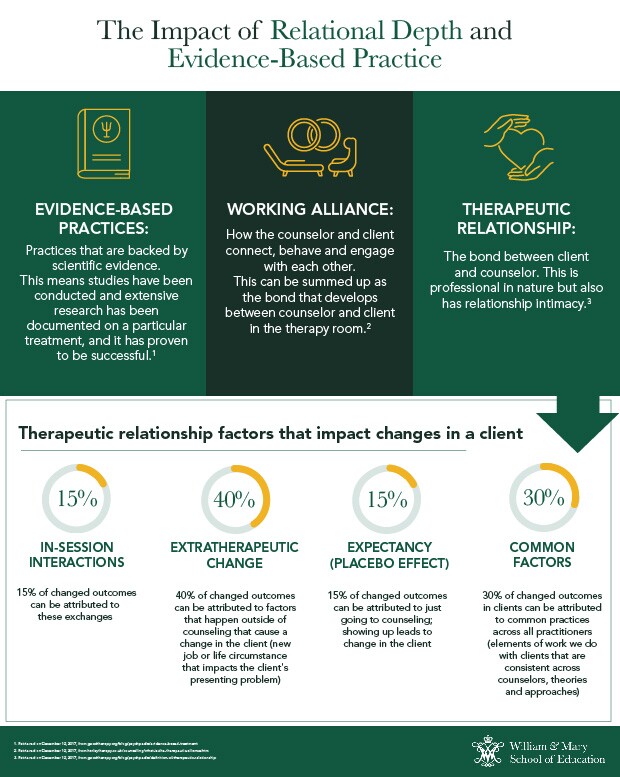In counseling, the relational depth between you and your client is of the utmost importance. Developing a strong and trusting relationship formed with evidence-based practices matters greatly, because the better the relationship, the greater the likelihood that your client will experience positive results. After learning your client’s history, you’ll determine which factors are individualized and try to identify through existing research which interventions are best suited for patient treatment.
When you begin your practice and start interacting with clients, it’s important to remember that even if you feel you lack knowledge of evidence-based practices or not yet well versed in techniques, use of theory, assessment or strategic intervention, as long as you are developing a deep and trusting therapeutic relationship with your clients, you’re off to the right start.
The Impact of Relational Depth and Evidence-Based Practices
Evidence-based practices: Practices that are backed by scientific evidence. This means studies have been conducted and extensive research has been documented on a particular treatment, and it has proven to be successful.1
Working alliance: How the counselor and client connect, behave and engage with each other. This can be summed up as the bond that develops between counselor and client in the therapy room.2
Therapeutic relationship: The bond between client and counselor. This is professional in nature but also has relationship intimacy.3
Therapeutic relationship factors that impact changes in a client:
- 15% In-session interactions: 15% of changed outcomes can be attributed to these exchanges
- 40% Extratherapeutic change: 40% of changed outcomes can be attributed to factors that happen outside of counseling that cause a change in the client (new job or life circumstance change that impacts the client's presenting problem)
- 15% Expectancy (placebo effect): 15% of changed outcomes can be attributed to just going to counseling; showing up leads to change in the client
- 30% Common factors: 30% percent of changed outcomes in clients can be attributed to common practices across all practitioners (elements of work we do with clients that are consistent across counselors, theories and approaches)
If you are considering answering the call to help others and would like to learn more about evidence-based practices and developing strong therapeutic relationships, consider how the Online M.Ed. in Counseling from William & Mary can help you evolve on your path to a fulfilling profession.
- Retrieved on December 12, 2019, from goodtherapy.org/blog/psychpedia/evidence-based-treatment
- Retrieved on December 12, 2019, from harleytherapy.co.uk/counselling/what-is-the-therapeutic-alliance.htm
- Retrieved on December 12, 2019, from goodtherapy.org/blog/psychpedia/definition-of-therapeutic-relationship


